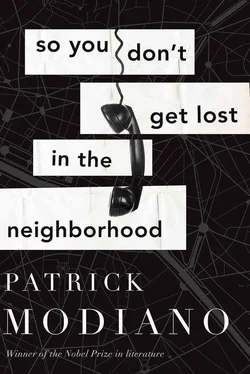“She was murdered in a hotel in Paris. . no-one ever knew who by. . She often used to come to Saint-Leu-la-Forêt. .”
When Annie returned from Paris, at about two o’clock in the morning, he had heard shrieks of laughter in the corridor on several occasions. That meant she was not alone. Then the bedroom door was closed and mutterings would reach him through the partitions. One morning, they had given this Colette Laurent a lift to Paris in Annie’s car. She was sitting in the front, beside Annie, and he was alone on the back seat. They had walked with her in the Champs-Élysées gardens, where the postage stamp market was situated. They had stopped at one of the stalls, and Colette Laurent had given him a pack of stamps, a series of different colours bearing the image of the king of Egypt. From that day on, he had begun to collect stamps. The album in which he arranged them gradually in rows behind strips of transparent paper, this album may have been put away in the cardboard suitcase. He had not opened that suitcase for ten years. He could not part with it, but he was nevertheless relieved to have lost the key.
On another day, they had gone, with Colette Laurent, to a village on the other side of Montmorency forest. Annie had parked her car outside a sort of small château, and she had explained to him that this was the boarding school where she and Colette Laurent had met. They had visited the boarding school with him, shown round by the headmistress. The classrooms and the dormitories were deserted.
“So, you don’t remember Colette?”
“Yes. . of course,” said Daragane. “You knew each other at boarding school.”
She looked at him in surprise.
“How did you know?”
“One afternoon, you took me to visit your old boarding school.”
“Are you sure? I have no memory of it.”
“It was on the other side of Montmorency forest.”
“I never took you there with Colette. .”
He did not want to contradict her. He might find explanations in the book that the doctor had inscribed to him, that little book with white covers about forgetfulness.
They were walking along the footpath, next to the Ranelagh gardens. Because of the night, the trees and the presence of Annie, who had taken his arm, Daragane had the impression that he was walking with her, as he used to do, in the Montmorency forest. She stopped the car at a crossroads in the forest, and they walked as far as the Fossombrone pond. He remembered some of the names: the Chêne aux Mouches crossroads. The La Pointe crossroads. One of these names made him feel frightened: the Prince de Condé’s cross. At the little school at which Annie had enrolled him and from which she often came to collect him at half-past four, the teacher had talked about this prince whom they had discovered hanged in his bedroom at the château of Saint-Leu without anyone ever knowing the precise circumstances of his death. She called him “the last of the Condés”.
“What are you thinking about, Jean dear?”
She was leaning her head on his shoulder, and Daragane wanted to tell her that he was thinking about “the last of the Condés”, about school and about walks in the forest. But he was afraid she might reply: “No. . You’re wrong. . I haven’t any memory of it.” He, too, during these past fifteen years, had eventually forgotten everything.
“You must invite me to your room. . I should like to go back to the place Blanche neighbourhood with you.”
Perhaps she remembered that they had spent a few days in this neighbourhood before leaving by train for the south of France. But, there again, he did not dare put the question to her.
“You would find the room too small. .” said Daragane. “And besides, it’s not heated. .”
“That doesn’t matter. . you can’t imagine how we used to freeze to death in this neighbourhood, in winter, when we were very young, my brother Pierre and I.”
And at least this memory was not painful to her, since she burst out laughing.
They had reached the end of the footpath, very close to the Porte de la Muette. He wondered whether this smell of autumn, of leaves and moist earth, did not come from the Bois de Boulogne. Or else, over time, from the Montmorency forest.
They had made a detour to rejoin what she called, with a touch of irony, her “place of residence”. As they walked along together, he felt himself overcome by a gentle amnesia. Eventually, he came to wonder how long he had been in the company of this stranger. Perhaps he had just met her, on the path by the gardens or outside one of these buildings without any windows at the front. And if he happened to notice a light, it was always at the window of a floor at the very top, as though somebody had left a long time ago and forgotten to switch off a lamp.
She squeezed his arm, and it was though she wanted to reassure herself of his presence.
“I always feel frightened when I come back home on foot, at this sort of time. . I no longer know exactly where I am. .”
And it was true that they were crossing a no-man’s-land, or rather a neutral zone in which they were cut off from everything.
“Supposing you needed to buy a pack of cigarettes or find a chemist open at night. . it’s very difficult around here. .”
Once again, she burst out laughing. Her laughter and the noise of their footsteps echoed in these streets, one of which bore the name of a forgotten writer.
She took a bunch of keys out of her coat pocket and tried several of them in the front door lock before finding the right one.
“Jean. . will you come up with me. .? I’m frightened of ghosts. .”
They were in the hallway with its black and white tiling. She opened a double door.
“Would you like me to show you round the ground floor?”
A suite of empty rooms. Pale wooden floors and large bay windows. A white light beamed down from the built-in wall lamps, just below the ceiling.
“This must have been the drawing room, the dining room and the library. . At one time, Roger Vincent used to store goods here. .”
She closed the door, took his arm and led him towards the staircase.
“Would you like to see the second floor?”
Once again, she opened a door and switched on the light which came from the same kind of wall lamps at ceiling-height. An empty room like those on the ground floor. She slid back one of the bay windows, in which the glass was cracked. A large balcony overlooked the trees in the gardens.
“It was the former owner’s gym room. . The one who lived here before the war. .”
Daragane noticed some holes in the floor, a floor that appeared to have the consistency of cork. Attached to the wall was a piece of wooden furniture with slots that supported some small dumbbells.
“It’s full of ghosts here. . I never come here just on my own.”
On the first floor, by the door, she put a hand on his shoulder.
“Jean. . Can you stay with me tonight?”
She led him into the room that was used as a drawing room. She did not switch on the light. On the sofa, she leant over and whispered in his ear:
“When I have to leave here, will you put me up at your room in place Blanche?”
She stroked his forehead. And, still in a low voice:
“Pretend that we hadn’t known each other before. It’s easy. .”
Yes, it was easy after all, since she had told him that she had changed her name, and even her first name.
AT ABOUT ELEVEN O’CLOCK AT NIGHT, THE TELEPHONE rang in his study, but he did not pick up the receiver and waited for a message to be left on the answering machine. Breathing, regular at first, then increasingly halting, and a faraway voice; he wondered whether it was a woman’s or a man’s. A groan. Then the breathing began again and two voices mingled with one another and whispered without his being able to distinguish the words. Eventually, he turned off the answering machine and disconnected the telephone. Who was it? Chantal Grippay? Gilles Ottolini? Both of them at the same time?
Читать дальше












